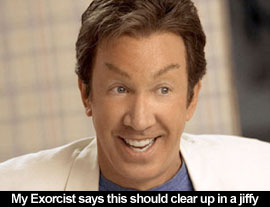ZERO STARS/****
starring Tim Allen, Jamie Lee Curtis, Julie Gonzalo, Dan Aykroyd
screenplay by Chris Columbus, based on the novel Skipping Christmas by John Grisham
directed by Joe Roth
 by Walter Chaw Jamie Lee Curtis is looking alarmingly like Kim Hunter from Planet of the Apes and Tim Allen remains the single most aggressive, unpleasant personality who's supposed to be sunny and hilarious in the medieval endurance ritual that is Christmas with the Kranks. An act of self-flagellation like wearing a hair shirt, say, or whipping oneself with a cat-o-nine tails whilst chanting the liturgy, the picture has all the Christmas cheer of a reindeer carcass and is the finest evocation of being in Hell since The Passion of the Christ. People voting for "moral values" this last election should take a good hard look at Christmas with the Kranks, which purports to champion all those old-fashioned, God-fearing, middle-American moral landmarks (family, community, Christmas) but ends up championing consumerism, venality, hedonism, vanity, and intolerance. So much intolerance, in fact, that it plays rather well as a horror movie. A character is asked if a family not celebrating Christmas is Jewish or Buddhist: "No, none of that," he says. It reminds a lot of that "Twilight Zone" episode "The Monsters are Due on Maple Street," where a crisis shows suburban everymen to be monstrous, tribal, and dogmatic.
by Walter Chaw Jamie Lee Curtis is looking alarmingly like Kim Hunter from Planet of the Apes and Tim Allen remains the single most aggressive, unpleasant personality who's supposed to be sunny and hilarious in the medieval endurance ritual that is Christmas with the Kranks. An act of self-flagellation like wearing a hair shirt, say, or whipping oneself with a cat-o-nine tails whilst chanting the liturgy, the picture has all the Christmas cheer of a reindeer carcass and is the finest evocation of being in Hell since The Passion of the Christ. People voting for "moral values" this last election should take a good hard look at Christmas with the Kranks, which purports to champion all those old-fashioned, God-fearing, middle-American moral landmarks (family, community, Christmas) but ends up championing consumerism, venality, hedonism, vanity, and intolerance. So much intolerance, in fact, that it plays rather well as a horror movie. A character is asked if a family not celebrating Christmas is Jewish or Buddhist: "No, none of that," he says. It reminds a lot of that "Twilight Zone" episode "The Monsters are Due on Maple Street," where a crisis shows suburban everymen to be monstrous, tribal, and dogmatic.
There's a wonderful, haunted Dan Simmons short story called "The River Styx Runs Upstream" in which technology has made the resurrection of beloved family members possible, though the resurrected are barely recognizable as human. It's an iteration of the W.W. Jacobs story "The Monkey's Paw", of course, a fictionalized platitude of watching what you wish for, and the tale's melancholic tone–its themes of surfacing and being unable to let go of the past–colour the best films of 2004.

 by Walter Chaw
by Walter Chaw